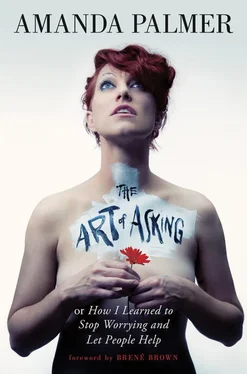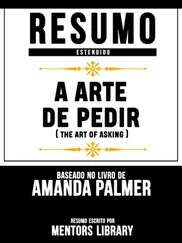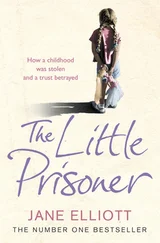Why? Because I talk to my fans?
But, like, who DOES that? I mean, YOU can get away with it because you’re Amanda Palmer Queen Of The Internet “it’s all one big happy family” and whatever. But that is NOT us. Do you know how fucking CRUCIFIED we’d get if we even so much as mentioned that we had a mailing list? We don’t even announce that we have merchandise for sale… it just seems so tacky .
Well, dude, you’ve got nothing to lose. Your tour is tanking. And it might not be so bad. In fact, if you ask your fans for help, they might surprise you .
How?
They might be really flattered that you trusted them enough to look uncool .
• • •
Crowdsurfing is like couchsurfing is like crowdsourcing.
You’re falling into the audience—you’re asking them to help you. By asking, you’re building.
Crowdsurfing is where this moment of trust is at its physical paragon, and best of all, it’s set to the climactic soundtrack of the art itself: the music.
You stand at the lip of the stage, you trust, and you dive.
There is nothing in the world like being held aloft in the cloud of loudness by a sea of random, sweaty arms, every single one of them like a tree in a huge, storm-blustered forest of trust, being floated along by hundreds of fingers and palms. I also feel a sympathetic rush when I look out into the crowd during shows and see the audience hoisting each other up, holding one another in the air, carefully but impulsively pushing each other over the crowd with the cooperative, fevered camaraderie of a barn raising set to a rock-and-roll score. You’re a human-sized symbol of trust, and if you don’t stay in circulation, you not only cease being a gift… you become a liability. Falling to the ground from a crowdsurf isn’t pretty. But you survive. And, usually, people grab your arm and pull you back up. That’s also a wonderful feeling.
Side note: If you ever get a chance to crowdsurf, do it. It’s a blast. Stash your wallet somewhere you won’t lose it, don’t wear loose jewelry, and for god’s sake, no sharp heels, you wanna kill someone?
• • •
After almost four years of nonstop touring and recording side by side, Brian and I experienced classic band burnout. Even though we’d graduated from The Vulva to a van (named Ludwig) to a rented tour bus, we were driving each other mad. We took a break and I started working on my first solo record, Who Killed Amanda Palmer , the one with the dead/naked-Amanda photo book I’d asked Neil to help me caption. Touring on my own sounded liberating and lonely at the same time—so I hired Zoë Keating, who plays intricate, electronically looped solo cello music, to open for me and play on a handful of my new songs during the stage show. Then I called my friend Steven Mitchell Wright, an Australian theater director whose work draws on the Japanese Butoh tradition, in which performers paint themselves white and writhe in joyously painful existential ecstasy.
Want to figure out a way to add some theater to my tour? I asked him. There’s almost no budget. But we’ll create something magnificent with some actors, I’ll pay for their flights and make sure everybody has a place to stay and food to eat. We’ll need to pass the hat for your salaries. You may also have to help me find couches for us to sleep on .
Steven, who is crazy in the very best ways, said yes and selected three equally crazed and committed Australian performers, and threw in Lyndon, his classical violinist friend, as a bonus. Steven named this company The Danger Ensemble, and they became my touring art family for the next year.
We drove around America, Canada, Europe, and Australia in various cheap tour buses and vans, relying heavily on crowdsourced generosity. Zoë and my sound and light crew were paid a regular support wage, but Steven and The Danger Ensemble relied on the generosity of the crowd throughout the entire tour. Each night onstage, I would introduce them all towards the end of the show and announce that these performers had come on tour with me for no fixed salary and were relying on the audience. The five of them would rove through the crowd during the next song, holding their boots to collect donations. Some nights, they made less than a few hundred dollars. Other nights, they’d make over a thousand. It balanced out. I was relieved, but I wasn’t surprised that the crowd liked helping.
While my busking, bohemian circus friends had no problem passing the hat, not everybody was quite so comfortable. I once brought an opening band on tour with me: five guys in dapper suits who played cabaret music for half an hour before I hit the stage. As the tour progressed, they got into the spirit of all-hands-on-deck and backed me up for five or six of my own songs—learning a new song each night during our soundcheck. I suggested we ask the audience to directly reward their extra effort, and so they went into the crowd, each night, hats in hand, where the fans happily gave them an extra few hundred dollars. It all worked splendidly, but there was one musician in the band who hung back in the dressing room and refused to take part. I asked him one night why he didn’t join the others.
I just… can’t , he said. It’s embarrassing, Amanda. It feels too much like… begging .
But the fans didn’t seem to mind being asked. On the contrary, it made them feel included at a new level.
We also crowdsourced our nightly meals, which was a new test for my professional crew, who were accustomed to a tour diet of ordinary takeout pizza, falafel, and pad thai. I wasn’t certain they’d be thrilled about trading consistency for adventure. Towards the beginning of the tour, I had a conversation in Dublin with one of my sound guys who was somewhat suspicious.
Are you sure about this? Some of your fans are pretty intense and I mean… doesn’t it sort of creep you out? They could put, like, anythingin our food .
But I trust these people , I said. I trust them more than I trust, I dunno, random line cooks in restaurants who might piss in my food because they hate their jobs. These people like me. Why would they hurt me?
I’m just saying… watch yourself, Amanda. You trust people too much .
Sometimes a supreme feast would arrive: In Philly and Seattle we were treated to five-course dinners created by chefs who spent two days in preparation for the meal and arrived backstage with burners, sauces, and flambées. In Chicago, a restaurant owner who was dating a fan supplied us with twenty-five varieties of sushi rolls. There was also a flip side. In one Austrian city, a girl arrived with a single red plastic beach pail filled with undercooked pasta. We supplemented that night’s dinner with takeout falafel.
• • •
Neil and I were in a giant drugstore, in a hurry, and all we needed to buy were condoms and tampons. I approached a woman who worked there who seemed to be in her late seventies, and asked her. Then I proudly called out to Neil, who was in another aisle, loud enough that he, and everyone else in the drugstore, could hear me:
HONEY, I FOUND OUT WHERE THE CONDOMS AND THE TAMPONS ARE. THEY’RE BOTH HERE IN AISLE FIVE .
Neil came around the corner into the aisle I was in, looked at me, and began to laugh.
Darling , he said, you’re human after all. You’re blushing. You’re embarrassable .
I could feel my cheeks burning. He was right. I’d been trying to prove how fearless I was, but truthfully, I had embarrassed myself.
He loves telling people the story of the time that he learned I was not quite as shameless as he had believed: the time he saw Amanda blush, when she asked for a tampon.
Читать дальше












